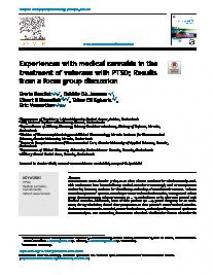Experiences with medical cannabis in the treatment of veterans with PTSD : Results from a focus group discussion.
Posttraumatic stress disorder (PTSD) is an often chronic condition for which currently available medications have limited efficacy. Medical cannabis is increasingly used to treat patients with PTSD; however, evidence for the efficacy and safety of cannabinoids is scarce. To learn more about patients' opinions on and experiences with medical cannabis, we organized a focus group discussion among military veterans (N = 7) with chronic PTSD who were treated with medical cannabis. Afterwards, some of their partners (N = 4) joined the group for an evaluation, during which they shared their perspective on their partner's use of medical cannabis. Both sessions were audio-recorded, transcribed verbatim, and analyzed by means of qualitative content analysis. Five overarching themes were identified. The first four themes related to the different phases of medical cannabis use - namely, 1) Consideration; 2) Initiation; 3) Usage; and 4) Discontinuation. The fifth theme related to several general aspects of medical cannabis use. Patients used medical cannabis to manage their symptoms and did not experience an urge to "get high." They used a variety of different cannabis strains and dosages and reported several therapeutic effects, including an increased quality of sleep. Furthermore, discussions about the experienced stigma surrounding cannabis generated insights with implications for the initiation of medical cannabis use. These results underscore the value of qualitative research in this field and are relevant for the design of future clinical trials on the use of medical cannabis for the treatment of PTSD.
Geachte bezoeker,
De informatie die u nu opvraagt, kan door psychotraumanet niet aan u worden getoond. Dit kan verschillende redenen hebben,
waarvan (bescherming van het) auteursrecht de meeste voorkomende is. Wanneer het mogelijk is om u door te verwijzen naar de bron
van deze informatie, dan ziet u hier onder een link naar die plek.
Als er geen link staat, kunt u contact opnemen met de bibliotheek,
die u verder op weg kan helpen.
Met vriendelijke groet,
Het psychotraumanet-team.
In: European Neuropsychopharmacology ; ISSN : 0924-977X | 36 | Juli | 244-254
https://doi.org/10.1016/j.euroneuro.2020.04.009


